Sure, billionaire real estate tycoon Donald Trump is an obnoxious silly birther.
But we should take
Trump's suggestion of a 25 percent tariff on Chinese imports as a welcome opportunity to side-step the hysterical Smoot-Hawley invoking and trade war invoking reactions. We should welcome an open public discussion and debate that questions our nation's unusual hewing to free trade orthodoxy in a market that East Asian and European successes do not follow free trade.
First off, America's dynamic time of growth, 1890 to 1920
was in a period of high tariffs.
Calling attention to the Smoot-Haley trade act is deceptive. As one blogger at Market Oracle notes in "Why Donald Turmp is right on trade," reputable economists, even free traders, from liberal Paul Krugman to conservative Milton Friedman, dispute Smoot-Hawley's role in the Great Depression.
Read further, this important blog post. (Of course, I am not endorsing Trump or all opinions in the politics of the referenced site.),
Ian Fletcher, "Why Donald Trump is Right on Trade" at marketoracle.co.uk.
The usual suspects are racing to debunk Donald Trump’s foray into the most serious protectionism—a 25% tariff on China—proposed by a major presidential candidate since Patrick Buchanan ran in 1992.
They know this is big. Our long-delayed national trade debate has begun.
I have expressed reservations about getting obsessed with just China before. But broadly speaking, Trump is right on the money here. Nothing less than an actual tariff or the equivalent is ever going to get Beijing to stop gaming the international trading system to America’s disadvantage.
This matters, big-time. Because until we sort out America’s trade mess—which must start by zeroing out, or close to it, our $600 billion-a-year trade deficit—our economy will never truly be healthy again.
Jobs are the aspect of this everyone understands. But what a lot of people miss is that the current budget fight, and the angst over our mounting national debt, are also intimately connected to trade.
So Trump is onto something even bigger than people realize.
The budget fight ultimately comes down to the fact that we don’t have an economy large enough to generate tax revenue commensurate with the spending we have voted for. But why isn’t our economy big enough? Start with the fact that, as economist William Bahr has estimated, America’s accumulated trade deficits since 1991 alone have caused our economy to be 13 percent smaller than it otherwise would be. The trade deficit costs us about one percent in GDP growth every year, and that compounds over time.
As for our national debt, or, more properly, our bloating public and private indebtedness? As I explained at length in another article, borrowing money (and selling off existing wealth, which has the same net effect) is a mathematically inevitable result of running trade deficits. The only way this can not happen is if a) the aforementioned $600 billion isn’t real money, or b) America is trading with Santa’s elves.
So, Mr. Trump… How do we rebalance America’s trade, starting with China?
Forget about doing it by playing nice. China will only give up one-way free trade (free for America, protectionist for them) when they are coerced into doing so. They are making far too much money to ever give up this sweet racket voluntarily.
We are constantly warned that imposing a tariff on China would trigger a trade war. But the curious thing about the concept of trade war is that, unlike actual shooting war, it has no actual historical precedent. In fact, the reality is that there has never been a significant trade war.
Anyone who knows otherwise, please name one.
The usual example free traders give is America's Smoot-Hawley tariff of 1930, which supposedly either caused the Great Depression or caused it to spread around the world. But this canard does not survive serious examination, and has actually been denied by almost every economist who has actually researched the question in depth—including many free traders and ranging from Paul Krugman on the left to Milton Friedman on the right. (I debunked this myth at length in this article.)
There is, in fact, a basic unresolved paradox at the bottom of the very concept of trade war. If, as free traders insist, free trade is beneficial whether or not one's trading partners reciprocate, then why would any rational nation start one, no matter how provoked? Wouldn’t they just keep lapping up the benefits of one-way free trade, if it’s so good for them?
Furthermore, if the moneymen in Beijing, Tokyo, Berlin, and the other nations currently running trade surpluses against the U.S. start to ponder exaggerated retaliation against the U.S., they will soon discover the advantage is with us, not them. Because they are the ones with the trade surpluses to lose, not us. What exactly does the U.S. have to lose in a trade war? The only way a deficit nation can “lose” a trade war is by having its trade balance get even worse. Given that the U.S. trade balance is already outlandish, it is hard to see how this could happen.
Supposedly, China could suddenly stop buying our Treasury Debt.
Indeed they could, but this would immediately reduce the value of the $1.15 trillion or so they already hold. Furthermore, this would depress the value of the dollar—exactly the opposite of their currency manipulation strategy.
Then there is the awkward problem of what China would do with all the money it would get by selling off its dollars. There just aren't that many good alternatives for parking that much money. Japan doesn't want its currency used as an international reserve currency, and the Euro has huge problems. Assets like gold and minor currencies are volatile or in limited supply. Others, like real estate or corporate stocks, are still denominated in those pesky dollars and euros.
We are still a nuclear power, so at the end of the day, China cannot force us to do anything that we don't want to. We could—a grossly irresponsible but not impossible hypothetical—repudiate our debt to them (or stop paying the interest) as the ultimate countermove.
More plausibly, we might simply restore the tax on the interest on foreign-held bonds that was repealed in 1984 thanks to Treasury Secretary Donald Regan. We have lots of little cards like that up our sleeve.
So an understanding will, most likely, be reached. A deal (one of Mr. Trump’s favorite words!) will be struck. I think Mr. Trump understands this better than anyone else. That’s one of the things I like about him.
The reality is that the United States is already in a trade war with China. Kowtowing to China today is economic appeasement, with the same result as political appeasement in the 1930s: a few more years of relative quiet with a bigger explosion at the end.
At some point, America's ability to run gigantic deficits must end, due to a prolonged slide or sudden crash in the value of the dollar. The longer we wait, the greater the likelihood that it will come as a sudden and destabilizing shock, rather than a managed, more gradual adjustment.
This issue is bigger than China alone. How America deals with China will set the precedent, and establish or destroy America's credibility, for dealing with a long list of other nations.
Believe me, they’re watching Trump now in Tokyo, Berlin, and Brussels.
Ian Fletcher is the author of the new book Free Trade Doesn’t Work: What Should Replace It and Why (USBIC, $24.95) He is an Adjunct Fellow at the San Francisco office of the U.S. Business and Industry Council, a Washington think tank founded in 1933. He was previously an economist in private practice, mostly serving hedge funds and private equity firms. He may be contacted at ian.fletcher@usbic.net.
















